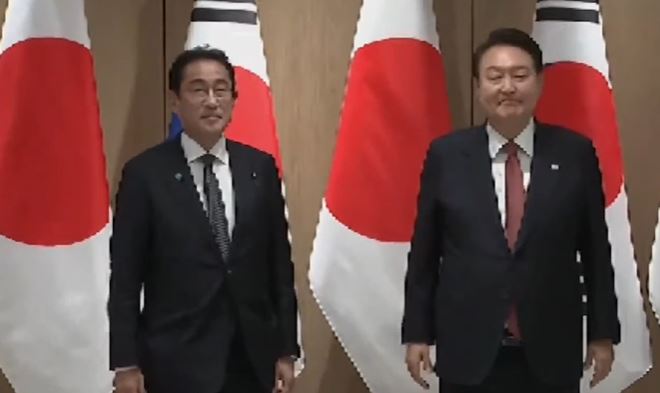Shared Concerns Over Regional Security
South Korean President Yoon Suk Yeol and Japanese Prime Minister Fumio Kishida have expressed mutual concerns regarding the burgeoning relationship between Russia and North Korea. The two leaders, who met on the sidelines of the NATO summit in Washington, emphasized the importance of continued security cooperation to address these geopolitical challenges. This alignment underscores a significant shift in East Asian diplomatic dynamics amidst escalating global tensions.
Context of the Meeting
The NATO summit provided a pivotal backdrop for President Yoon and Prime Minister Kishida to discuss the implications of the growing Russia-North Korea ties. This development is seen as a potential threat to regional stability and international security. The summit, attended by key global leaders, facilitated crucial dialogues on various international security issues, with a particular focus on the evolving alliances in East Asia.
Strengthening Bilateral Relations
In their discussions, Yoon and Kishida underscored the necessity of enhancing their countries’ security collaboration. This comes at a time when both nations are navigating complex relationships with their respective neighbors and seeking to bolster their strategic positions. The meeting between the two leaders signifies a reinforced commitment to mutual support and collective security measures.
Concerns Over Russia-North Korea Alliance
The increasing cooperation between Russia and North Korea has raised alarm bells in both Seoul and Tokyo. This alliance, perceived as a direct threat, has prompted South Korea and Japan to reconsider their strategic postures. The potential for enhanced military collaboration between Russia and North Korea could destabilize the already volatile situation on the Korean Peninsula and in the broader region.
Focus on Security Cooperation
President Yoon and Prime Minister Kishida agreed to maintain close communication and coordination to counter the potential threats posed by the Russia-North Korea partnership. This agreement is part of a broader strategy to ensure regional stability and to safeguard their national interests against external aggressions. The leaders’ consensus on this matter reflects a unified approach to tackling shared security challenges.
Geopolitical Implications
The implications of a stronger Russia-North Korea alliance are profound, not only for South Korea and Japan but also for the broader international community. Such an alliance could shift the balance of power in East Asia and complicate diplomatic efforts aimed at denuclearizing the Korean Peninsula. The strategic cooperation between Seoul and Tokyo is therefore crucial in mitigating these risks and maintaining a stable security environment.
Historical Context
The historical tensions between South Korea and Japan add a layer of complexity to their current collaboration. Despite past disputes and unresolved historical issues, the urgency of addressing contemporary security threats has brought the two nations closer. Their joint efforts in countering the Russia-North Korea axis highlight a pragmatic approach to diplomacy and security.
Future Prospects
Moving forward, the sustained collaboration between South Korea and Japan will be essential in addressing the evolving security landscape in East Asia. Both nations are likely to continue their efforts in strengthening bilateral and multilateral alliances, enhancing their military capabilities, and engaging in proactive diplomacy to ensure peace and stability in the region.
Conclusion
The meeting between President Yoon Suk Yeol and Prime Minister Fumio Kishida at the NATO summit marks a significant step in fortifying the security partnership between South Korea and Japan. Their shared concerns over the Russia-North Korea relationship underscore the need for vigilant and coordinated responses to emerging threats. As the geopolitical landscape continues to shift, the alliance between Seoul and Tokyo will play a pivotal role in maintaining regional stability and promoting international security.
Soumya Smruti Sahoo is a seasoned journalist with extensive experience in both international and Indian news writing. With a sharp analytical mind and a dedication to uncovering the truth, Soumya has built a reputation for delivering in-depth, well-researched articles that provide readers with a clear understanding of complex global and domestic issues. Her work reflects a deep commitment to journalistic integrity, making her a trusted source for accurate and insightful news coverage.



